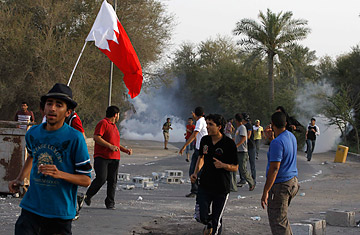
Anti-government protesters flee after riot police fire rounds of tear gas to disperse them in the mainly Shi'ite village of Diraz.
Hours before Bahrain's Shi'ite opposition set out on its last major demonstration against the Sunni ruling party, a son of a famous activist followed in his father's footsteps and was arrested by government forces in a 1 a.m. raid that left the family's windows — and its confidence — shattered. The prominent clan, a seemingly steely symbol of the country's anti-government revolution, has now seen the imprisonment, release, and re-arrest of the father (whereabouts still unknown), the beating of a sister, the trashing of a house and detention of cousins and brothers. On Friday evening, hiding out at a friend's home, another son calls TIME. Usually upbeat, he has changed his tone, just as other activists in this tiny island Kingdom have as well. "I need to leave Bahrain," he says, voice shaking. "What channels can I use?"
By all accounts, Bahrain's protests have had the wind knocked out of their sails the past two weeks, as the government systematically shut down the opposition's operations. Leading activists were arrested en masse, many in pre-dawn raids. The headquarters of opposition group Waad was torched. As Manama was put under martial law, 100 Saudi Arabian tanks arrived on March 13 to help police the streets. Salmaniya Medical Center, a main gathering point for protesters and the country's most sophisticated hospital, was essentially locked down. At checkpoints around the city, masked thugs pulled drivers out of cars at the slightest suspicion of anti-government activity, often beating them senseless. A kingdom had imposed a reign of terror — with anecdotes and examples of how vengeance is exacted. "The injuries, the bullet holes, are always in the back — as people are leaving," one official said.
On Thursday night riot police and tanks pre-emptively went into hotbeds Daih and Sitra. The government swiftly aborted the opposition plan to march on Friday from the villages surrounding the city and the central Shi'ite neighborhoods of Senabis and Daih to the site of the bulldozed Pearl Square roundabout, the former epicenter of the protest movement. And so, rather than gathering in one spot, protesters were relegated to small uprisings their own neighborhoods, which were tightly encircled by checkpoints. Manama itself was a ghost town. At the offices of opposition party al-Wefaq, morale was low.
The fear tactics seem to have worked in getting the activists to abandon their demonstrations. Now, the protesters are back at pursuing dialogue, a tactic that was abandoned largely because of popular anger at the Saudi intervention and the ensuing violent crackdown on peaceful protesters. Says Sheikh ali-Salman, head of the opposition party al-Wefaq: "The only solution to all this now is a political solution. We are the regulator, we will take the lead to have this dialogue. As the opposition, we are accepting."
Crown Prince Salman bin Hamad Al Khalifa praised Friday's crackdown, saying "security and stability have played a crucial role in ensuring Bahrain's landmark achievements and development strides." He also stressed the importance of "engaging Bahrainis who wished well for their homeland," apparently a call for the two sides to resume dialogue. The Interior Ministry said in a statement that "police forces were instructed to deal appropriately with all such gatherings to maintain safety, stability and security in Bahrain." He added that one "gathering started to attack police officers, resulting in the police using tear gas to disperse the group."
Reached by phone at his home in Daih on Friday evening, Matar Ebrahim Ali Matar, who represents al-Wefaq on the government's Council of Representatives, said he could still hear tear gas and rubber bullets popping off. He brought up what he called an atrocity: the case of Isa Mohammed Ali, 71, who he said died after suffocating on tear gas. Ali's family, Matar says, called the emergency number but received no response or help from Salmaniya Hospital. The Interior Ministry denies the details of Ali's death, saying the elderly man died of natural causes.
Now that the revolution has stumbled, al-Wefaq leader al-Salman says protesters will no longer impede the economy, as they had when they took over Financial Harbor, the hub of the kingdom's business district. Says al-Salman: "I don't think they will stop the protests, but we need to make the demonstrations peaceful, without clogging the roads, and let the dialogue start."
How can they go on protesting without marching in the street? Al-Salman says activists can go up to their roofs after the city-wide curfew to chant and release protest balloons. Though unlikely to make much of an economic or political dent, al-Salman says it reinforces the protest's new, more subtle message. "Political societies ask that they go on the roof every night," he says, "and ask that they say they are there." The government may only find ways to burst their balloons.
